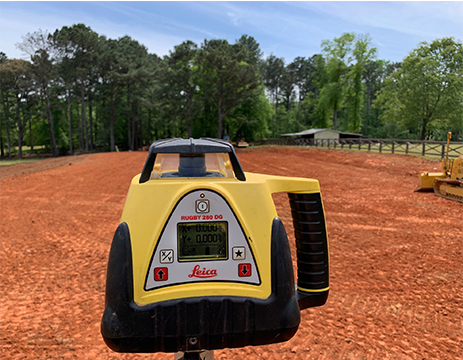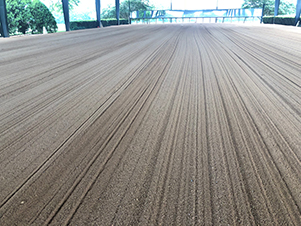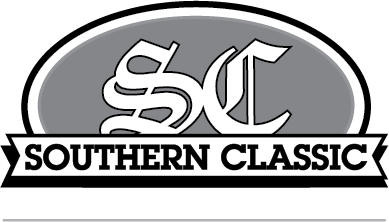Horse Arena Guidelines
Georgia Horse Arenas have become very popular over the last 10 years. As interest in all facets of equestrian disciplines has expanded in Georgia, the demand for personalized and commercial riding facilities has accelerated rapidly. To make sure you make a wise decision that fits your horse, property, and budget, Southern Classic Horse Arenas advises that you read the following information. The more you know about the challenges you face and the decisions you will need to consider the happier you will be with the final arena. The challenges are:
- ARENA BUILDER: Who has the past experience to build mine?
- SIZE: What is the correct size necessary for my use?
- SUB-BASE: Do I need crushed stone or merely Georgia clay?
- COMPACTION: What pitfalls result from lack of compaction?
- TOPPING: Which is the correct topping for my style of riding?
- THICKNESS: What thickness will prevent injuries to horse and riders?
These questions need to be addressed and settled before the first spade of dirt is turned, as a mistake in any of these five areas can produce an arena that does not meet your specific needs, can be dangerous for both horse and rider, and create undue expense if it has to be corrected afterward.
HORSE ARENA BUILDER:
Should you ask the average grading operator if he can build you an arena, in most cases he will answer “Yes”. If you then ask for his references, where he has built them before, however, often there are none. Good graders do not automatically equate to a good arena builder. How do you know whom to call? Ask the owner of an existing arena you enjoy riding in who built their arena, or research ads in equestrian magazines in your area. By asking for references where this grader has built previous arenas, you can determine the degree of satisfaction those owners have with their facility. Are his arenas laser graded for optimum accuracy? Does he work from an engineered site plan?
HORSE ARENA SIZE:
Five basic sizes are commonly in use in Georgia. For dressage 66 ft. wide x 132 ft. long (20 x 40 Meter), or 66 ft. wide x 198 ft. long (20 x 60 Meter). For jumping arenas 75’ x 150’, 100’ x 200’, and 150’ x 300’. Unique dimensions are buildable as well. Where possible, it is best to build it large enough the first time, as enlargement later on can be a challenge due to the crowning and swales.
SUB-BASE FOR YOUR ARENA, Soil or Aggreagte? Most weather or All Weather?:
Red Georgia clay makes an excellant and afordable base. It compacts extremely well, providing a solid base that works best under dry conditions. This clay has been exported out of state to build arenas due to its outstanding consistency. This base material is typically alrady onsite making it more affordable to acheive a basic long lasting and durable base.
Today many request "all weather" surfaces refering to a surface that drains faster and is ready to ride right after and in some occasions during a rain event. Some equestrian manuals advise you to put 4-6" inches of crushed  stone down as a base before application of manufactured sand. Should you choose an all weather surface you will need to have a non-woven fabric barrier placed between this stone and the manufactured sand. Otherwise, over a period of time the stone will work its way up to the top and you will be riding on hard rock. The sub-base should be built with a crown running down the center line, falling 1.25% -1.5% to the outside. Thereby you will be riding on the same level from one end of the arena to the other.
stone down as a base before application of manufactured sand. Should you choose an all weather surface you will need to have a non-woven fabric barrier placed between this stone and the manufactured sand. Otherwise, over a period of time the stone will work its way up to the top and you will be riding on hard rock. The sub-base should be built with a crown running down the center line, falling 1.25% -1.5% to the outside. Thereby you will be riding on the same level from one end of the arena to the other.
COMPACTION FOR HORSE ARENAS:
If the sub-base material is not properly compacted progressively in 4” lifts, your arena will be spongy and hold water for months on end, making it virtually unrideable during this time. This condition can also cause injury to the horses as their hooves will mire down into the clay. Proper compaction provides an impervious surface that will drain very rapidly after a rain, enabling you to ride quickly thereafter. If this facet of your arena is neglected, it may necessitate removing all the topping material with a resultant loss of much sand, and the need to recompact the base of the entire arena. This can double the cost of your facility. While compacting the arena, it should be crowned in all directions from the center point with a 1-1 ½% slope in all four directions.
GEORGIA HORSE ARENA TOPPING:
In Georgia the two most common arena toppings in use are river sand and manufactured sand. River sand is primarily used in applications where a loose footing is desired, like barrel racing, bull-dogging, etc., as you want the horse to be able to slide.  It is also used as a final top coat over manufactured sand to hold down dusting. In dressage and jumping arenas applying 1-1 ½” of river sand over the manufactured sand is the maximum recommended depth, as any amount beyond this can cause your horses to slip and fall.
It is also used as a final top coat over manufactured sand to hold down dusting. In dressage and jumping arenas applying 1-1 ½” of river sand over the manufactured sand is the maximum recommended depth, as any amount beyond this can cause your horses to slip and fall.
Manufactured sand, sometimes identified as rock-dust, M-10’s or 810’s, is the gray sand present at most large equestrian parks. Unlike river sand, it binds together providing a cohesion and firmness dressage and jumping require. It also drains very fast, allowing you to resume riding soon after a rain. It is used in approximately 90% of the arenas in Georgia. Four inches is the standard application.
Additional products like ground rubber or fiber can be added to the topping by applying 1-1 ½” of river sand upon the manufactured sand base, and then mixing the added topping into the river sand. Again, laser grading the footing material will provide a uniform depth of footing and a smooth riding surface.
An improperly constructed arena can cost you thousands to make over. Nearly 50% of our work is fixing bad arenas others built. Save yourself that heart-ache and expense. A quality built arena, with minimal regular maintenance by proper dragging, will provide many years of pleasurable use. Taking the time to select a quality arena builder upfront will save you many headaches and protect your investment.
Happy riding!
Luke Butler
Southern Classic Arenas
